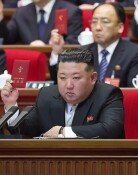Blind Trust System for Public Officials Finalized
Blind Trust System for Public Officials Finalized
Posted September. 14, 2004 22:06,
The number of public officials that will be affected by the blind trust system to be instituted next year has been greatly reduced from the governments original plans. To begin with, public officials of class 1 or over holding stocks that are unrelated to their positions will be exempted from the blind trust requirement.
Consequently, Assemblyman Chung Mong-joon and other National Assembly members who own their own companies will not be required to sell their stock holdings or place them in a blind trust as long as they do not belong to a National Assembly standing committee associated with the business interests of those companies.
The government finalized the amended Public Officials Ethics Law, which contains the above provisos, on September 14 after deliberation by the State Council, and resolved to submit the bill to the National Assembly within the month.
According to the amended bill, public officials of class 1 or higher who own stocks exceeding the value limit set down by the blind trust system can not only maintain their stock holdings but also add to them if such holdings are confirmed as being unrelated to their positions in public office.
The bill defines the criterion used to determine whether a given stock is eligible for such an exemption as the stockholders ability, either directly or indirectly, to gain access to information or exercise influence on the stock in question. Final decisions regarding each specific case will be made by the Blind Trust Inspection Committee.
The president, the National Assembly chairman, and the Supreme Court chief justice will each nominate three of the nine members of the Blind Trust Inspection Committee.
Vice Minister of Government Administration and Home Affairs Kwon O-ryong stated, In consideration of the view that requiring public officials to sell their stock holdings or place them in trust regardless of the relevance of those stocks is a violation of their Constitutional right to own property, we have opted to subject such holdings to a relevance inspection by a separate committee.
For those officials whose stocks are adjudged as being relevant to their public offices, the amended bill specifies that their stock holdings must exceed a minimum total value of 30 million~100 million won, to be determined by presidential decree, in order to be considered eligible for the blind trust system. If a public official resists or violates these requirements, they will be subject to less than one year in prison or 10 million won or less in fines.
As of December 31, 2003, the number of public servants of class 1 or higher with 30 million won or more in stocks is 525; among them, 333 hold positions in local governments.
The Ministry of Government Administration and Home Affairs predicted that the majority of those subject to the blind trust requirement, once instituted, will be local council members, as a large number of them own businesses related to their local governments such as construction companies.
The blind trust system is designed to prevent public officials from making profits by trading stock based on information gained through their public offices, and requires eligible public officials to hand over completely the right to manage, move, and sell their stocks to a trust management company during their terms in office.
Hyun-Doo Lee ruchi@donga.com







